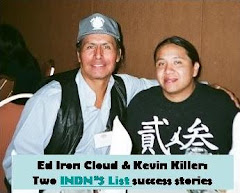 Judge calls Cobell historical accounting 'impossible'
Judge calls Cobell historical accounting 'impossible'Yesterday, Judge James Robertson ruled that a government accounting is impossible after hearing arguments in a ten day trial last next October. After 11 years of litigation in the courts and debate in Congress, Judge Robertson on Wednesday declared an historical accounting of the Indian trust "impossible." Robertson took over the case after Judge Royce Lamberth was removed by the U.S. Court of Appeals for the District of Columbia Circuit in July 2006, which said he had lost his objectivity.
The government had asked that Lamberth be replaced after the Judge Lamberth lambasted the Interior Department, writing in a decision that labelled the Department of Interior "is a dinosaur _ the morally and culturally oblivious hand-me-down of a disgracefully racist and imperialist government that should have been buried a century ago."
In his decision, Robertson detailed the extensive background of the case, saying that it would "stretch the limits of understatement" to say the case's history has been exhaustively chronicled in district court. He noted there are 3,504 entries on the case's docket and 10 circuit judges have been engaged in the case. His opinion will have the shorthand of "Cobell XX," he noted.
In a 165-page decision, Judge James Robertson said the Interior Department is "unable to perform an adequate accounting" of the Individual Indian Money (IIM) trust. The government "has not" and "cannot" cure its breach of trust to hundreds of thousands of Indian beneficiaries who have never been told how much money they are owed for the use of their land, he wrote.
"Indeed, it is now clear that completion of the required accounting is an impossible task," said Robertson, who describe the breach of trust as "irreparable."
The upshot of this historic decision is to finally establish a powerful place from which Native plaintiffs may negotiate with the federal government who has been one of the most egregious foot-dragging defendents in the history of all litigation. The Cobell Lawsuit (AKA the Trust Fund Litigation) is a class action lawsuit filed in 1996 by Elouise Cobell on behalf of herself and thousands of other similarly situated Natives across America which asked that the federal government account for all outstanding individual Indian moneys that have been "held in trust" or otherwise (mis)managed under the guise of the "Trust Responsibility" established through treaties and other agreements with Indian people.
"This is a great day in Indian Country," Cobell said yesterday. "We've argued for over ten years that the government is unable to fulfill its duty to render an adequate historical accounting, much less redress the historical wrongs heaped upon the individual Indian trust beneficiaries."
"Instead of truthfully seeking to remedy the government's admitted historical mismanagement, the government elected to fight plaintiffs every step of the way," she said. "Judge Robertson has settled the debate in favor of plaintiffs and found that an adequate historical accounting is, in fact, impossible."
The government proposed paying $7 billion partly to settle the Cobell lawsuit in March 2007, but that was rejected by the plaintiffs, who estimate the government's liability could exceed $100 billion. The Interior Department estimates that it has spent $127 million on its accounting in the past five years.
Sen. Byron Dorgan, D-N.D., chairman of the Senate Indian Affairs Committee, said Wednesday that he hopes the judge's decision is a catalyst for a settlement.
"Ultimately the question is going to be for the administration and the Justice Department, are they willing to settle for all of these years of mismanagement," he said.
Judge Hits Gov't on Indian Money Delay (Washington Post, January 30, 2008)
For complete access to all of the documents filed in over eleven years of litigation, please visit: Indian Trust: Cobell v. Kempthorne
Pioneer Editorial: Judge gives the Dickens to Interior (Bemidji Pioneer, January 31, 2008)

































































3 comments:
Thank you, that was extremely valuable and interesting...I will be back again to read more on this topic.
Brilliant web site, I had not come across emailstosms.blogspot.com previously in my searches!
Keep up the excellent work!
Hi - I am definitely delighted to find this. great job!
Post a Comment